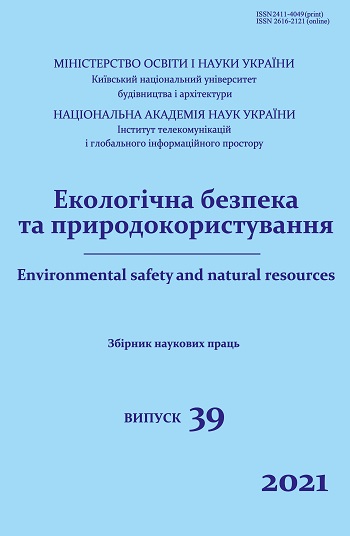Methodical approaches to the evaluation of surface pollution of water objects in the area of mining enterprises (on the example of Donetsk-Pridniprovsk region)
DOI:
https://doi.org/10.32347/2411-4049.2021.3.69-75Keywords:
pollution, surface water bodies, anthropogenic impact, quality index, self-healingAbstract
The most important component of ecologically safe development of natural and socio-economic systems is the use of nature, which involves the organization of water resources, which ensures sustainable development and for a long time retains sufficient water potential. The ХХІ century is characterized by significant negative changes in the natural environment caused by the uncontrolled use of natural resources, the development of industry and transport, which leads to increased water consumption and at the same time increase its pollution. This has been particularly noticeable over the last 50 years, when human impact on the planet's water cycle has reached a global scale. Deterioration of the ecological condition of surface waters is due to qualitative and quantitative depletion of factors of their formation, which in some cases makes it impossible to use them for economic purposes. Water quality of water bodies is formed under the influence of both natural and anthropogenic factors. As a result of human activity in reservoirs many anthropogenic substances of various degree of toxicity can arrive. The article attempts to assess changes in surface water quality over the past decade and to determine the degree of natural and man-made transformation of rivers in the region and the possibility of their self-restoration and stabilization of the ecological danger of the region. The existing methods of assessment of water bodies by chemical indicators used in the area of operation of mining enterprises are considered. In some methods, the assessment of water bodies usually reflects regional features rather than their own pollution. Calculations for the water basin river Siverskyi Donets are made and relevant patterns are established.
References
Bylinkina, A.A., Drachev, S.M., & Itskova, A.I. (1962). On the methods of graphical representation of analytical data on the state of reservoirs. In Mater. 16th hydrochem. meeting (pp. 8-15). Novocherkassk [in Russian].
Gagarina, O.V. (2005). Review of methods for integrated assessment of surface water quality. Earth Sciences, 11, 45-58 [in Russian].
Zhukinsky, V.N., Oksiyuk, O.P., Oleynik, G.N., & Kosheleva, S.I. (1980). Criteria for a comprehensive assessment of the quality of surface fresh water. In Self-purification and bioindication of contaminated water (pp. 57-63). Moscow: Nauka [in Russian].
Zamolodchikov, D.G. (1993). Estimation of ecologically admissible levels of anthropogenic impact on freshwater ecosystems. In Problems of ecological monitoring and modeling of ecosystems (Vol. XV, pp. 214-233). Sankt Peterburg: Gidrometeoizdat [in Russian].
Kurylenko, V.V. (Ed.). (2004). Fundamentals of ecogeology, bioindication and biotesting of aquatic ecosystems. Sankt Peterburg: SPbGU [in Russian].
Patin, S.A. (1979). Impact of pollution on biological resources and productivity of the world's oceans. Moscow: Pishchevaya prom-t [in Russian].
Udod, V.M., Wildman, I.L., & Zhukova, E.G. (2014). Development of modern biocoenotic methods of control of ecological condition of river hydroecosystems. Eastern European Journal of Advanced Technologies, 5/10(71), 4-11 [in Russian].
Kulinich, Y.I., & Zhukova, О.G. (2013). Reduction of technogenic impact of the inflow of the Kalmius river basin of the Kalchyk river due to the use of the coastal bioplateau. In Actual problems of modern hydroecology: collection. mate. scientific-practical conference dedicated to the 95th anniversary of the National Academy of Sciences of Ukraine (pp. 55-56). Kyiv [in Ukrainian].
Downloads
Published
How to Cite
Issue
Section
License
Copyright (c) 2021 Olena Voloshkina, Olena Zhukova, Irina Korduba, Daniil Marshall

This work is licensed under a Creative Commons Attribution 4.0 International License.
The journal «Environmental safety and natural resources» works under Creative Commons Attribution 4.0 International (CC BY 4.0).
The licensing policy is compatible with the overwhelming majority of open access and archiving policies.

